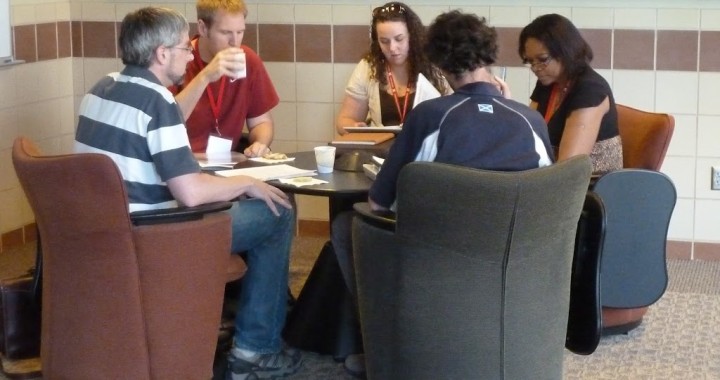Reflective practice with your peers
We have all had those moments in our youth work career. We are stuck and we don’t want to go to the boss because we don’t want to seem incompetent. So we lean across the aisle/cube/partition and ask a colleague what they would do. Sometimes our reflective practice is not so worrying. You are having lunch and you pose a question about how you might approach a new young person to the group. On the other hand you were just chewed out about how you dealt with a particular case and you are looking for some affirmation so you explain what you did to your colleagues. When a group of peers work together to support each other through reflective practice it is called PEER CONSULTATION.
 Peer Consultation, unlike a chat about the weekend around the water cooler, describes a process in which critical and supportive feedback on style and worker identity is emphasized while evaluation of practice is not. Consultation, in contrast to supervision, is characterized by the youth worker’s, “right to accept or reject the suggestions [of others]” (Bernard& amp; Goodyear, 1992, p. 103).
Peer Consultation, unlike a chat about the weekend around the water cooler, describes a process in which critical and supportive feedback on style and worker identity is emphasized while evaluation of practice is not. Consultation, in contrast to supervision, is characterized by the youth worker’s, “right to accept or reject the suggestions [of others]” (Bernard& amp; Goodyear, 1992, p. 103).
The terms ‘peer supervision’ and ‘peer consultation’ have both been used to describe similar relationships amongst colleagues. However, at Ultimate Youth Worker we believe that the difference is the outcome of the process. In ‘peer supervision’ colleagues provide a clinical evaluation of each other’s work to better individuals and the group. In ‘peer consultation’ colleagues focus on providing mutual support and advice to the individual using reflective practice.
The foundation of peer consultation is steeped in the understanding that individuals who are trained in helping skills using these same skills to help each other function more effectively in their professional roles. According to Benshoff & Paisley (1993), peer consultation provides a number of benefits to youth worker’s on the coal face including:
- Decreases dependency on ‘expert’ supervisors and provides greater interdependence of colleagues;
- Increases responsibility of youth worker’s for assessing their own skills and those of their peers, and for structuring their own professional growth;
- Increases self-confidence, self-direction, and independence;
- Development of consultation and supervision skills;
- Use of peers as models;
- Ability to choose the peer consultant; and,
- Lack of ‘clinical’ evaluation.
 Peer consultation comes in two forms. Informal chats over the partition with your colleagues and more formalised group consultations. Whichever form it takes just do it. Spending time with your colleagues in reflective practice helps you to strengthen your practice and hone your skills in a supportive environment. It provides a safe place to critically reflect on your practice within the confines of your peer network.
Peer consultation comes in two forms. Informal chats over the partition with your colleagues and more formalised group consultations. Whichever form it takes just do it. Spending time with your colleagues in reflective practice helps you to strengthen your practice and hone your skills in a supportive environment. It provides a safe place to critically reflect on your practice within the confines of your peer network.
Reference
Benshoff, J.M., & Paisley, P. O. (in press). The Structured Peer Consultation Model for School Counselors. Journal of Counseling and Development
Bernard, J.M., & Goodyear, R. K. (1992). Fundamentals of clinical supervision. Needham Heights, MA: Allyn & Bacon.
Leave us a comment below or post a comment on facebook and twitter
.






This is a very good way of working and can encourage us to be more critical and reflective of not just each others but our own work also.
I would also say it is important for us to undertake ‘non-managerial supervision’ with a youth worker from outside of your organisation, or at least someone who is a qualified youth worker with no involvement in your work. this allows you to talk about situations more objectively and is an incredibly useful tool for developing your own best practice but also can be a great addition to any existing support structures.
Now Now Mike, don’t go jumping ahead. You will ruin all our future ideas for content.
external supervision is an area that we specialise in at Ultimate Youth Worker. We focus on youth worker identity and practice rather than the neo-managerialist bureaucracy that supervision has become in many human services fields.
We agree youth workers need quality supervision from other youth workers.